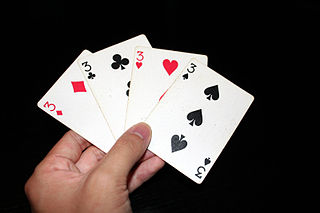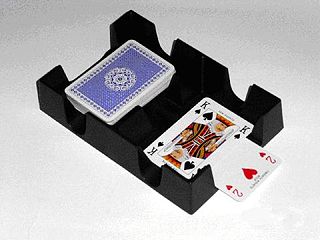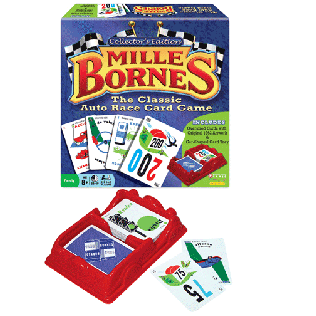
Gin rummy, or simply gin, is a two-player card game variant of rummy. It has enjoyed widespread popularity as both a social and a gambling game, especially during the mid twentieth century, and remains today one of the most widely-played two-player card games.

Canasta is a card game of the rummy family of games believed to be a variant of 500 Rum. Although many variations exist for two, three, five or six players, it is most commonly played by four in two partnerships with two standard decks of cards. Players attempt to make melds of seven cards of the same rank and "go out" by playing all cards in their hand. It is "the most recent card game to have achieved worldwide status as a classic".

Mille Bornes is a French designer card game. Mille Bornes is listed in the GAMES Magazine Hall of Fame.

Crazy Eights is a shedding-type card game for two to seven players. The object of the game is to be the first player to discard all of their cards. The game is similar to Switch and Mau Mau.

500 rum, also called pinochle rummy, Michigan rummy, Persian rummy, rummy 500 or 500 rummy, is a popular variant of rummy. The game of canasta and several other games are believed to have developed from this popular form of rummy. The distinctive feature of 500 rum is that each player scores the value of the sets or cards they meld. It may be played by 2 to 8 players, but it is best for 3 to 5.
Spite and Malice, also known as Cat and Mouse or Screw Your Neighbor, is a traditional card game for two or more players. It is a reworking of the late 19th century Continental game Crapette and is a form of competitive solitaire, with a number of variations that can be played with two or three regular decks of cards. It is descended from Russian Bank.

Golf is a card game where players try to earn the lowest number of points over the course of nine deals.

Rummy is a group of matching-card games notable for similar gameplay based on matching cards of the same rank or sequence and same suit. The basic goal in any form of rummy is to build melds which can be either sets or runs. If a player discards a card, making a run in the discard pile, it may not be taken up without taking all cards below the top one.

Bang! is a Spaghetti Western-themed social deduction card game designed by Emiliano Sciarra and released by Italian publisher DV Giochi in 2002. In 2004, Bang! won the Origins Award for Best Traditional Card Game of 2003 and Best Graphic Design of a Card Game or Expansion.

Skip-Bo is a commercial version of the card game Spite and Malice, a derivative of Russian Bank, which in turn originates from Double Klondike. In 1967, Minnie Hazel "Skip" Bowman (1915–2001) of Brownfield, Texas, began producing a boxed edition of the game under the name SKIP-BO. In 1980 the game was purchased by International Games, which was subsequently bought by Mattel in 1992. A mobile version of the game for iOS was released by Magmic in September, 2013. There is a new version called "SKIP-BO Mod" that comes in a white and blue case.
Speed is a game for two players or more of the shedding family of card games, in which players try to get rid of all of their cards first.
Tonk, or tunk, is a matching card game, which combines features of knock rummy and conquian. Tonk is a relatively fast-paced game that can be played by 2-4 players. It can be played for just points or for money wagered.
Yaniv, also known as Jhyap, Jafar or aa’niv, is a Nepalese card game popular in Israel. It is a draw and discard game in which players discard before drawing a new card and attempt to have the lowest value of cards in hand. The game is considered a backpackers game in Israel, and it's popular among soldiers and young adults returning from long backpacking trips.
Grave Robbers from Outer Space (GROS) is a card game designed by Stephen Tassie and published out by Z-Man Games. GROS parodies movies and movie clichés, especially those from science fiction and horror movies. It is played with a specially designed 120 card deck.

Four color cards is a game of the rummy family of card games, with a relatively long history in southern China. In Vietnam the equivalent game is known as tứ sắc.
Three thirteen is a variation of the card game Rummy. It is an eleven-round game played with two or more players. It requires two decks of cards with the jokers removed. Like other Rummy games, once the hands are dealt, the remainder of the cards are placed face down on the table. The top card from the deck is flipped face up and put beside the deck to start the discard pile.

Bing rummy is a variant of kalooki invented in the mining towns of Alaska. The game can be played with 2 to 8 players but works best with 3 to 6 players. It is unknown how the game came to be called “bing” although it may be because of the mining terms: unit of weight equal to 800 pounds, or a pile of rich lead ore. It is probably the second definition that gives the game its name referring to the pile of coins that accumulate throughout the game; especially as it is the Galena lead mines that popularized the term “bing ore”. These mines opened in 1919 about the time the game was developed.

Continental Rummy is a progressive partnership Rummy card game related to Rumino. It is considered the forerunner of the whole family of rummy games using two packs of cards as one. Its name derives from the fact that it is played throughout the continental Europe, the United States, Mexico, Canada, and also in South America. According to Albert Morehead, it was "at one time the most popular form of Rummy in women's afternoon games, until in 1950 it lost out to Canasta."
Indian Cherokee Rummy is a card game in India with little variation from original rummy. It may be considered a cross between Rummy 500 and gin rummy. Indian Rummy is a variant of the rummy game popular in India that involves making valid sets out of 13 cards that are distributed among every player on the table. Each player is dealt 13 cards initially; if the number of players is 2, then a 52 cards deck is chosen for the game and if there are 6 players, two decks of 52 cards each is combined for the game. Each player has to draw and discard cards by turns till one player melds his/her cards with valid sets that meet the Rummy validation rules. It could be that Indian Rummy evolved from a version of Rummy in South Asia, Celebes Rummy, also called Rhuk.
Buraco is a Rummy-type card game in the Canasta family for four players in fixed partnerships in which the aim is to lay down combinations in groups of cards of equal rank and suit sequences, there being a bonus for combinations of seven cards or more. Buraco is a variation of Canasta which allows both standard melds as well as sequences. It originated from Uruguay and Argentina in the mid-1940s, with apparent characteristics of simplicity and implications that are often unforeseeable and absolutely involving. Its name derives from the Portuguese word "buraco" which means “hole”, applied to the minus score of any of the two partnerships. The game is also popular in the Arab world, specifically in the Persian Gulf; where it is known as 'Baraziliya' (Brazilian). Another popular variation of Buraco is Italian.









